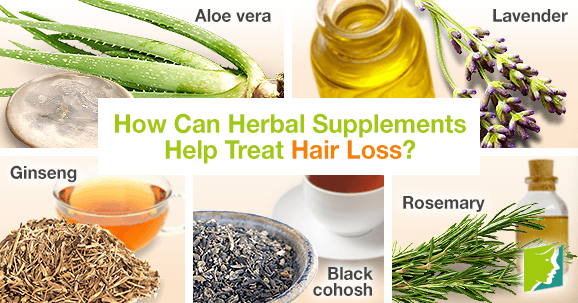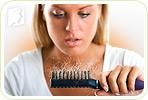During Menopause, hair can become patchy, thin, or brittle. This hair loss occurs primarily due to the hormonal changes that occur in these years, as hormone levels affect hair follicle health and influence the regrowth process. Using herbal supplements can help treat hair loss in some women; read on to see how certain herbs may nourish the hair follicles and stimulate speedy regrowth.
Aloe Vera
Aloe vera has long been prized as a go-to herb for treating skin conditions because of its nourishing vitamin E content. Vitamin E is a naturally hydrating antioxidant that neutralizes potentially damaging compounds in the body. Try gently rubbing aloe vera into the scalp to maximize follicle health, stimulate regrowth, and improve the health of existing hair by running it through the strands to improve condition and add shine.
Lavender
Lavender is an herb found to stimulate hair growth when applied topically to the scalp. Mix six drops of lavender oil with a carrier oil, such as jojoba, and massage it gently into the scalp with your fingertips to increase blood circulation to the head and boost regrowth of hair.
Ginseng
Ginseng has long been valued in traditional Chinese medicine, and how you use it is up to you; drinking herbal teas containing ginseng root can help speed up the regrowth of hair in areas that have thinned. Studies have shown that ginseng can be a helpful treatment for alopecia areata, one form of hair loss.
Black Cohosh
Black cohosh is an herb containing phytoestrogens, which mimic the activity of estrogen in the body. During perimenopause, drinking black cohosh tea can help restore hormonal balance, providing a long-term regulating effect.
Rosemary
Rosemary has anti-androgenic functions to help regulate the hormonal imbalances that cause hair loss during menopause. Infusing dried rosemary with water to make rosemary tea can help achieve this effect, but applying rosemary oil directly to the scalp will help counteract hair loss more directly.
If you are concerned that your hair loss is caused by underlying health issues rather than menopause, talk to your doctor. Combating menopausal hair loss takes patience, and regrowth can take time. Exploring other alternatives, such as styling your hair to hide the loss, or accentuating another of your features to distract attention may help.
Click to learn more about hair loss during menopause.
Sources
- Bhat, G. , Kudva, P. & Dodwad, V. (2011). Aloe vera: Nature's soothing healer to periodontal disease. Journal of Indian Society of Periodontology, 15(3), 205-209. doi:10.4103/0972-124X.85661
- Monfalouti, H.E. et al. (2010). Therapeutic potential of argan oil: A review. The Journal of pharmacy and pharmacology, 62(12), 1669-1675. doi: 10.1111/j.2042-7158.2010.01190.x
- Murata, K. et al. (2013). Promotion of hair growth by Rosmarinus officinalis leaf extract. Phytotherapy research, 27(2), 212-217. doi: 10.1002/ptr.4712
- National Center for Complementary and Alternative Medicine. (2012). Lavender. Retrieved June 2, 2014, from http://nccam.nih.gov/health/lavender/ataglance.htm
- National Health Service UK. (2013). Hair loss - Treatment. Retrieved June 2, 2014, from http://www.nhs.uk/Conditions/Hair-loss/Pages/Treatment.aspx
- Oh, G.N. & Son, S.W. (2012). Efficacy of Korean Red Ginseng in the Treatment of Alopecia Areata. Journal of Ginseng Research, 36(4), 391-395. doi: 10.5142/jgr.2012.36.4.391




